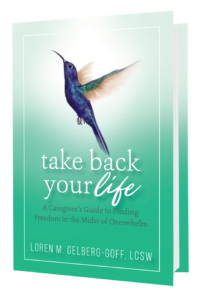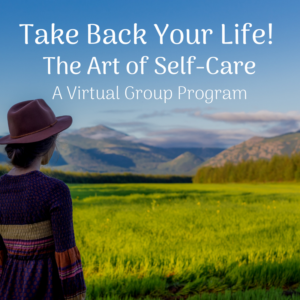More and more these days I am hearing from caregivers who come to me for help that a huge challenge for them is a constant feeling of anxiety, which in turn often interferes with their getting enough sleep.
If this is something you are also struggling with, be sure to check out this recent Reader’s Question and my response:
Sleep has been a major problem for me since I began worrying about my father. He’s been in fragile health for a number of years, so I’m used to staying alert for any signs that he needs additional attention and care. But since my mother died six months ago and he’s been alone, my anxiety level never really goes to zero.
Even hours after the lights are out, I find that I am constantly waking up and either waiting for the phone to ring, or worrying that he’s by himself and I won’t know if something happens and he needs help.
So, I thank you for the gift of your sleep meditation audio. It is truly helpful in getting me to fall sleep. But unfortunately, I cannot stop the worry that keeps waking me back up, multiple times per night…so I’m still missing out on much-needed shuteye!
Do you have any other suggestions for dealing with ongoing worry?
~ Bleary Eyed
Here’s My Response:
Dear Bleary,
I’m so glad that the sleep meditation to help you fall asleep is working for you, because that’s the first step in getting enough sleep. Sleep is an integral part of self-care, and worry and anxiety often cause problems with falling and staying asleep. They can also cause someone to sleep too much, as an escape from their worry and anxiety, but this is not true for most people.
Waking up repeatedly during the night is, in and of itself, frustrating and upsetting – so it adds even more stress to the situation. It can even begin to feel as though there is no solution to the problem.
However, there are steps you can take, even when your responsibilities are weighty and ongoing, to quiet your mind and ease yourself back into slumber. The most helpful is to understand that “worry” is actually fear and anxiety, which are always about the unknown. In the case of caregivers, the “unknown” usually entails unexpected health or safety situations that are beyond your control. Now that your father is living alone, there are some options to consider that can bring you some relief from your worry, and that greater sense of ease that will help you fall asleep and stay asleep.
When considering ways to handle the potential unknown events in caring for your father, it’s important to thoroughly assess his needs and accurately evaluate the risk factors of his continuing to live independently. If you determine that while frail, he is still safe at home right now (i.e., he is not likely to fall, absent-mindedly turn on the stove and walk away, or leave the house and get lost outside, or take pills that he shouldn’t, etc.), you may find that your worry is significantly reduced by subscribing to an electronic medical alert system with a button he can wear 24/7. That would enable him to easily get help rapidly if he notices any troubling medical symptoms. When you consider the cost of paying a home health professional to check on him periodically, these systems are extremely cost effective for the enormous peace of mind they provide.
If he is not safe at home alone, then it’s time to look at other available options. These can include bringing in a professional live-in aide, having him sleep at your home and attend senior care programs during the day, or even moving him into an assisted living facility where he would be monitored and cared for around the clock by appropriately trained staff.
These are options you can explore with your family and your father’s doctors, to determine what the most realistic and reasonable plan at this time might be. Simply having more knowledge of your options goes a long way in providing you with a greater sense of control and relief from worry.
It’s important to know upfront that not all options will feel good to you, because they are not going to be what you had hoped or planned for. They’re likely not going to be what your father was expecting, either! And our first reaction to something we didn’t anticipate, expect or want is an internal one – it feels wrong and bad internally, and our entire system – mental, emotional and physical – rebels and says “No!”
If this happens, it’s time to Stop! Breathe! and Focus…. Then ask that ever-important question: “What is my desired outcome?” And remember – a desired outcome must be what you want, NOT what you don’t want, and it must be something over which you have control. Once your initial feeling of immediately rejecting certain options passes, you can go back and reasonably explore your father’s situation and needs. Then you can start to more rationally consider which option(s) will, in the long run, help you feel less worried and anxious, which will help you sleep more soundly.
Acknowledge Yourself For The Important And Challenging Care You Provide! (…and A Personal Reflection)
As our parents age and experience mental, physical and emotional changes, and as they deal with cumulative losses among family and friends, our stress as their caring children increases. No one really prepares us for this part of our journey into adulthood. This is why it is so important to reach out for support and guidance, not only to learn about practical care options, but to learn new ways to deal with stress, anxiety, worry, uncertainty, doubt and grief.
I know that as my parents’ physical health and abilities began to fail, my father would say, “This is not what we expected. This is not what we wanted.” But it was what we had to face and come to terms with…and, just like you, we had to explore our options and determine which would best suit their personalities as well as their needs.
There is no one answer that’s guaranteed to banish worry for everyone managing parental care. But there are strategies, tools, ideas and support for finding what will work best for you. Recognize and reach out to the support system that you already have, and be willing to explore new ones. It may mean the difference between tossing and turning every night…and finally enjoying deep, restful and rejuvenating sleep!
Need more guidance… Click here to access your Step By Step Guide… You don’t have to go this alone!
Stay tuned for highly effective support systems in the coming weeks…and we breathe….




Recent Comments